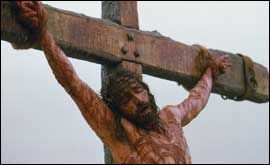Kat-astrophe
 Hurricane Katrina was one of the most devastating storms to ever hit the U.S., at least in recorded history. Thousands are feared dead, hundreds of thousands are homeless, and the monetary damage will surely be measured in the billions. Many look at Katrina's aftermath, and ask, "how could God allow something like this to happen?" They propose that either God was not involved, or that God does not exist... After all, how could a loving God allow this?
Hurricane Katrina was one of the most devastating storms to ever hit the U.S., at least in recorded history. Thousands are feared dead, hundreds of thousands are homeless, and the monetary damage will surely be measured in the billions. Many look at Katrina's aftermath, and ask, "how could God allow something like this to happen?" They propose that either God was not involved, or that God does not exist... After all, how could a loving God allow this?The prophet Amos said, "Shall there be evil in a city, and the Lord hath not done it?" (Amos 3:6, KJV). The Holman Christian Standard Bible translates this passage, "If a disaster occurs in a city, hasn't the Lord done it?" This is a rhetorical question posed by the prophet. He is not looking for an answer, but expects that the answer is already known. "If a disaster occurs in a city, hasn't the Lord done it?" The answer to this question is obvious... "of course".
So why would God send such a storm to wreak havoc upon this city, and this area? The Lord has not specifically revealed the answer to me. However, I do know that there is a reason. That reason, in my estimation, is most likely due to the following:
- When the name "New Orleans" is mentioned, most people immediately think of Mardi Gras. The revelry that occurs during this festival is well-known, and has drawn many comparisons to what occurred in the cities of Sodom and Gomorrah. Drunkenness, drugs, orgies, and all sorts of perversion fill Bourbon Street and the entire city as many prepare to celebrate Lent. Not only does such wickedness occur during Mardi Gras, but it has become a year round part of life in "The Big Easy".
- Another thing that the "Deep South" is well known for, especially in the region itself, is gambling. Riverboat Casinos are one of the largest money-making industries in the area, and was one of the hardest hit by Hurricane Katrina.
- Along with excess, sexual perversion, and covetousness, New Orleans and the outlying areas are also a hotbed for voodoo and the occult. Those who practice such things are engaged, whether knowingly or unknowingly, in the worship of devils.
We must remember that God is not just a God of love, but He is also a God of righteousness, justice, and wrath. Instead of looking at the destruction from Katrina and asking, "how could God allow this?", we should, instead, look at the wickedness that is in the world, and the wickedness that lies within each of us, and ask, "how can God be so patient, longsuffering, and merciful?"




